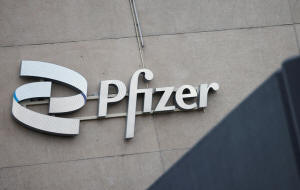Pfizer RSV shot meets goals in trial of high-risk adults under age 60
 Send a link to a friend
Send a link to a friend
 [April 09, 2024]
By Michael Erman [April 09, 2024]
By Michael Erman
(Reuters) - Pfizer said on Tuesday its respiratory syncytial virus (RSV)
vaccine Abrysvo was well tolerated and generated an immune response in
higher risk adults under the age of 60 similar to that in older adults,
for whom the shot is already approved.
Pfizer said it plans to submit its findings from the trial to seek
expanded approval of the vaccine in adults ages 18 to 59, but did not
give a time frame for when it expects the data to be considered by
regulators.
"This represents a real opportunity for an expansion to an age
population in a risk population that wouldn't normally see the
availability of this vaccine so soon," Dr. Iona Munjal, executive
director of clinical vaccine R&D at Pfizer, said in an interview.
The U.S. drugmaker last year launched Abrysvo for older adults and for
pregnant women to protect their babies from the virus. GSK also launched
its rival vaccine Arexvy in 2023 and has dominated the RSV vaccine
market over the first season they were available.

The British drugmaker is also looking to expand the age range for its
shot and has already submitted data for adults ages 50 to 59 to the U.S.
Food and Drug Administration. The FDA is expected to decide on whether
to approve the label expansion by June 7, which could allow GSK to offer
its shot in the younger age group later this year.
Pfizer did not say whether it expects to be able to expand Abrysvo's
label in time for the 2024-25 respiratory virus season.
RSV, which typically causes cold-like symptoms, is a leading cause of
pneumonia in toddlers and older adults.
[to top of second column]
|

Pfizer company logo is seen at a Pfizer office in Puurs, Belgium,
December 2, 2022. REUTERS/Johanna Geron/File Photo
 The late-stage trial of Pfizer's
shot involved 681 adults aged 18 to 59 with conditions including
asthma, diabetes, and chronic obstructive pulmonary disease that
increase the risk from RSV. In this group, the immune response was
non-inferior to the one observed in older adults, Pfizer said.
The company said those with a higher risk profile represent 9.5% of
U.S. adults 18 to 49 years of age and nearly a quarter of those
between the ages of 50 and 64.
Dr. David Boulware, an infections disease specialist at the
University of Minnesota, said he was not sure most Americans who fit
those high risk categories would need the shot.
People who have had organ transplants, are undergoing chemotherapy
for cancer, or are survivors of congenital disease would clinically
benefit from the shot, he suggested.
"The clinical benefit is likely going to be relatively low for most
people," he said.
(Reporting by Michael Erman; Editing by Bill Berkrot)
[© 2024 Thomson Reuters. All rights reserved.]This material may not be published,
broadcast, rewritten or redistributed.
Thompson Reuters is solely responsible for this content.
 |